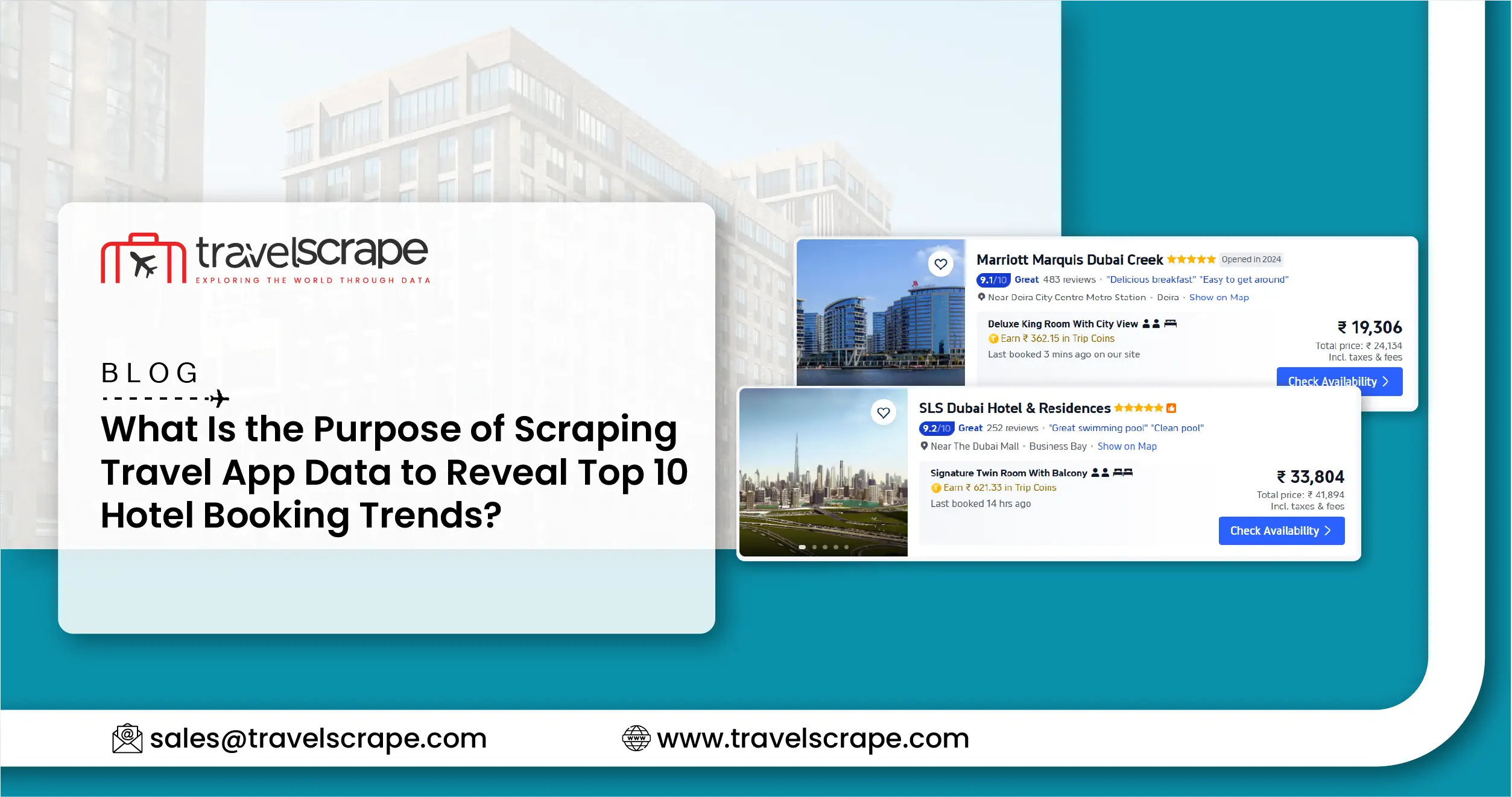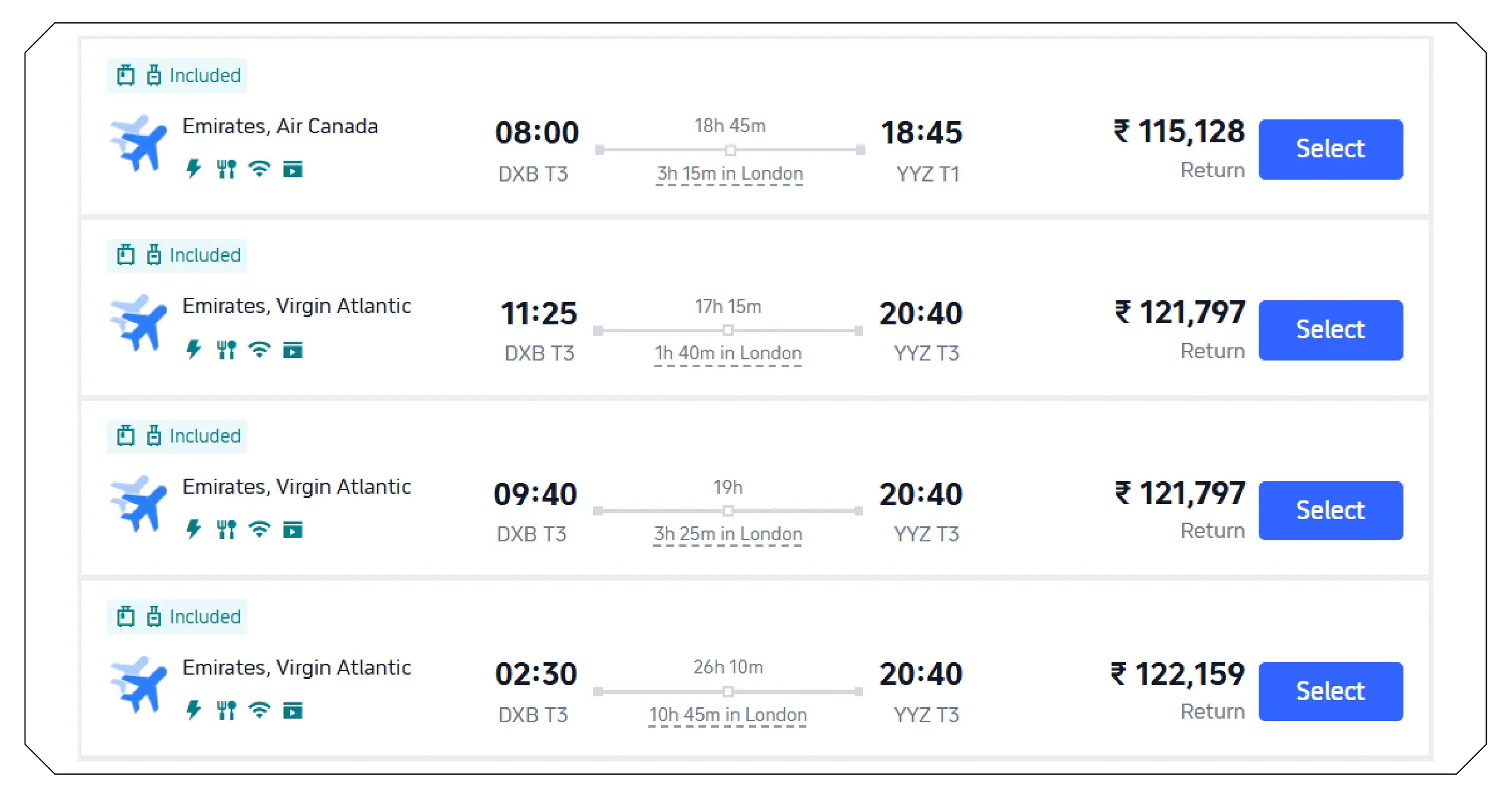What Is the Purpose of Scraping Travel App Data to Reveal Top 10 Hotel Booking Trends?

Introduction
The global travel and hospitality industry has transformed dramatically in the last decade, driven by the rapid digitalization of travel platforms, the growth of mobile booking apps, and the increasing dependence of travelers on online reviews and instant price comparisons. Understanding customer behavior, pricing fluctuations, and market dynamics within this ecosystem requires a robust data-driven approach. Businesses today can Scrape Travel App Data to Reveal Top 10 Hotel Booking Trends, enabling them to make informed decisions, optimize revenue strategies, and adapt to shifting traveler preferences.
The ability to collect structured, real-time, and large-scale datasets through Hotel Data Scraping Services empowers travel companies, hoteliers, and tourism boards to analyze booking behavior, pricing elasticity, and seasonal demand variations. These datasets uncover valuable insights into how, when, and where travelers book hotels, what factors influence their decisions, and which platforms dominate specific customer segments.
With the growth of AI-driven analytics, organizations can now Extract Hotel Booking Trends via Travel App Data Scraping to explore competitive pricing intelligence, regional demand fluctuations, and traveler demographics. These insights support more precise forecasting and personalized customer experiences while maintaining a competitive edge in the ever-evolving hotel industry.
Understanding the Value of Travel App Data

Travel apps like Booking.com, Expedia, Airbnb, Agoda, TripAdvisor, and Hotels.com generate billions of data points daily. These include hotel availability, room prices, occupancy rates, cancellation policies, guest reviews, and location-based amenities. Analyzing this massive volume of structured and unstructured data reveals patterns that shape hotel pricing strategies, occupancy forecasting, and marketing campaigns.
Real-time datasets sourced through Real-time extracte of hotel booking trends from travel apps help identify demand surges and supply constraints before they impact revenue. For example, data might reveal that a specific city’s hotel bookings spike during a music festival or that customers increasingly prefer eco-friendly accommodations.
The travel industry thrives on dynamic changes. By continuously tracking data through advanced web scraping, analysts can identify which destinations are trending, which property types (luxury, boutique, or budget) perform best, and how price sensitivity differs between weekday and weekend bookings.
Top Data Attributes Extracted from Travel Apps
To uncover the Top 10 Hotel Booking Trends, several key data points must be extracted and analyzed. These include:
- Hotel Name and Location – Identifies brand presence and regional performance.
- Star Rating and Amenities – Evaluates service quality and consumer appeal.
- Room Type and Availability – Helps forecast capacity utilization and demand.
- Price per Night and Discounts – Tracks pricing strategies and competitiveness.
- User Ratings and Reviews – Reflects customer sentiment and service gaps.
- Booking Time and Duration of Stay – Reveals traveler behavior patterns.
- Cancellation and Refund Policies – Affects customer decision-making and loyalty.
- Loyalty Program Data – Measures customer retention and repeat booking rates.
Through systematic scraping and cleaning, these attributes can be aggregated into structured datasets that reveal meaningful patterns about consumer preferences and market shifts.
Top 10 Hotel Booking Trends from Travel Apps
After analyzing travel app data from multiple platforms, the following ten trends have emerged as defining features of modern hotel booking behavior:
- Rise of Last-Minute Bookings Post-pandemic travel behavior shows a sharp increase in last-minute bookings. Customers are now waiting until days before departure to book hotels, driven by flexible cancellation policies and dynamic pricing models.
- Growth in Direct Booking Channels While OTAs (Online Travel Agencies) dominate the market, many travelers are now using apps to compare prices but finalize bookings directly through hotel websites to gain loyalty benefits and discounts.
- Shift Toward Sustainable and Eco-Friendly Properties Search volumes for eco-certified or “green” hotels have surged across travel apps. This trend reflects a conscious consumer shift toward sustainability and responsible tourism.
- Dominance of Mobile Bookings Over 70% of hotel reservations in 2024 were made via mobile devices. Travel app data shows an upward trajectory in mobile-based engagement and one-click bookings.
- Price Sensitivity and Dynamic Discounts Real-time data scraping reveals that travelers are increasingly responsive to flash sales, limited-time offers, and AI-driven discount recommendations. Price transparency across multiple platforms fuels this trend.
- Increased Demand for Short Stays Weekend getaways and “micro vacations” have become highly popular. Data from booking apps shows that stays of 1–3 nights now account for over 60% of all reservations.
- Popularity of Boutique and Independent Hotels Smaller boutique hotels and locally-owned accommodations are gaining momentum due to their personalized experiences and authentic local appeal.
- Surge in Family and Group Bookings The rebound of multi-generational travel post-pandemic has led to a rise in family suite bookings and large-room accommodations.
- Integration of Guest Reviews in Booking Decisions Guest reviews have become critical influencers. Businesses can leverage the Hotel Guest Review Dataset to identify service issues, monitor sentiment, and enhance customer experience.
- Preference for Flexible Booking and Refund Policies Consumers now prioritize flexibility. Data shows that hotels offering no-penalty cancellations enjoy 35% higher booking rates than those with strict terms.
Importance of Market Intelligence
Understanding booking trends isn’t just about knowing who books where—it’s about decoding why they do. Through advanced scraping tools, travel businesses can Scrape Hotel Booking Data from Travel Apps for Market Insights that go far beyond raw numbers. These insights reveal emotional drivers behind purchasing decisions, helping hospitality brands create highly personalized marketing strategies.
For example, a sudden spike in bookings for beachfront properties in Florida may correlate with seasonal trends or airline promotions. Recognizing these relationships in real time allows hotels to align marketing budgets and dynamic pricing algorithms accordingly.
Moreover, integrating scraped data with customer relationship management (CRM) systems helps hotels build comprehensive traveler profiles, enabling predictive analytics to forecast future behaviors.
Leveraging Hotel Data Intelligence
Modern analytics platforms built on Hotel Data Intelligence can process terabytes of structured and unstructured data from multiple travel sources. By combining price comparison data, customer feedback, and occupancy metrics, hoteliers can predict demand fluctuations and optimize revenue per available room (RevPAR).
Hotel chains now utilize predictive modeling to forecast how upcoming events, holidays, and flight schedules affect local booking rates. For instance, a city expecting a major tech conference may experience a surge in business travel bookings, prompting hotels to adjust room rates preemptively.
Intelligent data insights also facilitate competitive benchmarking, allowing brands to evaluate how their rates and amenities compare with nearby competitors.
Pricing and Availability Trends
Accurate market positioning requires constant visibility into competitor pricing strategies. Businesses can Scrape Travel App Data for Hotel Pricing and Availability Trends to monitor rate changes across different platforms and adjust accordingly.
Through automated crawlers, real-time pricing updates can be collected at hourly intervals, providing a comprehensive view of market movement. This enables yield managers to fine-tune promotions or adjust dynamic pricing based on occupancy forecasts.
The resulting Hotel Room Price Trends Dataset provides invaluable insights into:
- Price elasticity across seasons and regions.
- Impact of local events and travel restrictions on hotel pricing.
- Correlation between occupancy rates and average daily rates (ADR).
- Competitive analysis for pricing optimization.
By visualizing these patterns, hotels can adopt proactive strategies that maximize profitability while ensuring competitiveness.
How Web Scraping Enhances Market Research?
Web scraping travel app data empowers hoteliers and analysts to transform vast amounts of online data into strategic business intelligence. With properly structured scraping frameworks, analysts can extract millions of data points daily—each containing critical variables about traveler preferences, booking windows, and pricing fluctuations.
Benefits of web scraping for market research include:
- Real-time monitoring: Detect market changes as they happen.
- Competitive intelligence: Track rival hotel pricing, promotions, and occupancy patterns.
- Trend forecasting: Identify emerging destinations and peak booking seasons.
- Customer insights: Understand what drives positive reviews or cancellations.
This combination of real-time data and predictive analytics empowers organizations to remain agile and adaptive to rapid market shifts.
Case Example: Data Insights from Major Travel Platforms
A hypothetical case analysis of five major U.S. cities—New York, Miami, Chicago, San Francisco, and Orlando—shows how travel app data reveals significant market variations:
| City | Avg. Room Rate ($) | Avg. Occupancy (%) | Most Popular Booking Window | Notable Trend |
|---|---|---|---|---|
| New York | 245 | 88 | 10–15 days before stay | Surge in luxury bookings |
| Miami | 180 | 82 | 5–7 days before stay | High demand for beachfront stays |
| Chicago | 160 | 79 | 14–21 days before stay | Increase in business travel |
| San Francisco | 210 | 75 | 7–10 days before stay | Popularity of boutique hotels |
| Orlando | 155 | 85 | 3–5 days before stay | Family vacation demand |
This table demonstrates how scraping data from multiple platforms reveals localized booking behaviors, offering actionable insights for hotel revenue management teams.
Data Ethics and Compliance
While web scraping offers immense potential, adhering to ethical standards and data protection laws is crucial. Businesses must ensure that scraping activities respect website terms of service, avoid server overload, and comply with privacy regulations such as GDPR and CCPA.
Using official APIs, aggregators, or public datasets minimizes risk while maintaining transparency and data quality. Responsible scraping not only ensures compliance but also safeguards long-term credibility and trust.
Future Outlook of Hotel Data Scraping

The future of travel app data analysis lies in automation, AI integration, and predictive intelligence. Machine learning models will soon forecast demand surges weeks in advance, while natural language processing (NLP) will analyze millions of guest reviews for sentiment trends.
Predictive dashboards will merge booking and pricing data, offering hoteliers an all-in-one view of future market performance. Additionally, advanced visualization tools will display demand heatmaps and price fluctuation charts, enabling precise, location-based decision-making.
As AI-driven automation evolves, the combination of travel app scraping and real-time analytics will redefine how hospitality brands compete and grow.
How Travel Scrape Can Help You?
- Custom Travel App Scraping Solutions: We build tailored data extraction tools to collect hotel listings, prices, reviews, and availability from leading travel platforms like Booking.com, Expedia, and Airbnb.
- Real-Time Data Monitoring: Our systems continuously track price changes, seasonal trends, and booking behaviors to deliver up-to-date insights for better decision-making.
- Comprehensive Data Delivery: We provide structured datasets including hotel names, amenities, customer ratings, and pricing histories in easy-to-analyze formats (CSV, JSON, API).
- Market Intelligence & Analysis: Using advanced scraping analytics, we uncover competitive insights such as top-performing hotels, peak booking times, and regional demand shifts.
- Ethical & Scalable Data Collection: Our scraping services fully comply with data privacy and legal standards, ensuring reliable, scalable, and policy-safe data extraction from global travel platforms.
Conclusion
The hospitality sector’s success increasingly depends on how efficiently businesses leverage data from multiple travel platforms. Organizations that harness these insights can fine-tune their pricing, forecast demand, and enhance customer experience.
By applying powerful analytics to Extract Top Hotel Booking Patterns from Travel Apps, companies can uncover meaningful patterns that inform operational strategies, marketing campaigns, and inventory planning.
The ongoing advancements in Web Scraping Travel Apps for Top Hotel Booking Insights will continue to transform the way hotel data is collected and analyzed, paving the way for smarter decisions across the industry.
Finally, integrating these insights into a Hotel Availability Forecast Dataset allows hotels to anticipate demand fluctuations, monitor booking cycles, and strengthen competitive positioning. In a world where travelers expect seamless digital experiences, data scraping has become the cornerstone of innovation—unlocking unparalleled visibility into the evolving landscape of hotel bookings and consumer behavior.
Ready to elevate your travel business with cutting-edge data insights? Scrape Aggregated Flight Fares to identify competitive rates and optimize your revenue strategies efficiently. Discover emerging opportunities with tools to Extract Travel Website Data, leveraging comprehensive data to forecast market shifts and enhance your service offerings. Real-Time Travel App Data Scraping Services helps stay ahead of competitors, gaining instant insights into bookings, promotions, and customer behavior across multiple platforms. Get in touch with Travel Scrape today to explore how our end-to-end data solutions can uncover new revenue streams, enhance your offerings, and strengthen your competitive edge in the travel market.